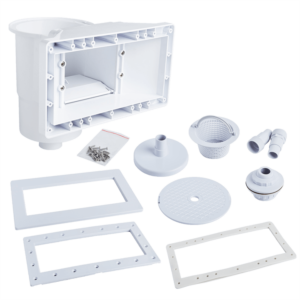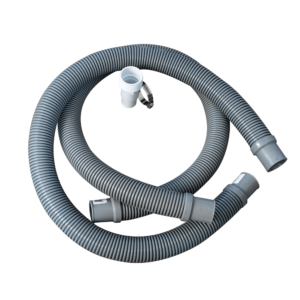
Detecting and Fixing Pool Liner Leaks: A Comprehensive Guide
Updated 7/7/2023
Nothing dampens summer fun more than discovering a leak in your pool liner. Leaks can lead to water damage, increased maintenance costs, and potential structural damage to your pool.
In this article, we’ll share the common causes of swimming pool leaks, the signs to watch out for, and step-by-step instructions on finding and repairing a leak in your pool liner.
Let’s dive in and learn how to conquer those pesky pool liner leaks once and for all!
Common Causes Of Swimming Pool Liner Leaks
Swimming pool liners leak can happen for a variety of reasons. Most commonly, leaks are caused by holes, punctures, or tears in the liner.
This type of damage to your liner usually happens while maintaining your pool. However, even with brand new pool liners, puncturing the vinyl material can occur through everyday use.
By pinpointing the cause of your issue, you can determine the best way to fix it. Here are some of the most common causes of swimming pool liner leaks.
- Aging and Wear: Your pool liner can deteriorate over time due to exposure to chemicals, UV rays, and consistent use. This wear and tear can weaken the liner, causing leaks.
- Poor Installation: If the liner doesn’t fit correctly or has gaps, water can seep through those areas. Check out our installation guide to help install your new liner properly and avoid damage.
- Sharp Objects: Even when you’re careful, tree roots, rocks, and other debris can puncture or tear the pool liner.
- Chemical Imbalance: Improper chemical balance in the pool water can accelerate the degradation of the liner, making it prone to leaks. Avoid high levels of chlorine, pH imbalances, or excessive chemical usage.
- Equipment Damage: Damage to pool equipment such as skimmers, return jets, or plumbing fittings can cause water to leak from the pool. Faulty or damaged equipment should be inspected and repaired quickly.
Signs of Leaks in Your Pool Liner
Detecting a leaking pool liner early on is crucial to prevent further damage and minimize water loss. But sometimes that’s easier said than done. Here are some common signs that indicate a potential leak in your pool liner:
- Decreased Water Level: If you notice a consistent drop in your pool’s water level after accounting for evaporation and splashing, it could be a sign of a leak.
- Excessive Chemical Usage: If you need to add chemicals more frequently to maintain proper water balance, it may indicate that water is escaping or becoming contaminated through a leak.
- Wet or Soft Areas Around Your Pool: You may not notice puddles, but check for damp or soft spots in the ground near the pool’s perimeter or beneath the pool equipment. These soft spots can be an indication of a leak.
- Issues with the Pool Deck: A leaking pool liner can seep water beneath the pool deck, leading to cracks, separations, or sinking. Inspect your pool deck for any visible signs of damage or water accumulation.
- Bubbling or Wrinkling: Look for any unusual bulges or distortions in your liner’s appearance. A leak can cause air to become trapped between the liner and the pool structure. This trapped air can result in bubbles or wrinkles forming on the surface of the liner. Look for any unusual bulges or distortions in the liner’s appearance.
- Increased Pump Run Time: A leaking pool liner can cause the water level to drop below the skimmer intake, affecting the pool’s circulation system. As a result, your pool pump may need to run longer or more frequently to maintain proper water flow.
How to Detect Leaks in Your Swimming Pool Liner
Pool leaks can be elusive, so patience and thoroughness are essential during the detection process. If you see water seeping at one end of the pool, it does not necessarily mean the hole is near that end of the pool.
DO NOT drain the water out of an above ground pool! You’ll ruin the liner and have to replace it.
Here’s what you do instead.
Perform a Visual Inspection
The most successful way to find a leak in a pool liner is to search the pool inch by inch with a pair of goggles. Look for tears, slits, and punctures in the vinyl.
As you search, pay attention to the fittings, skimmers, lights, and any other areas where leaks are commonly found.
While this may sound like a difficult and time-consuming approach, it is the most comprehensive and foolproof way to spot the exact location of the pool liner leak. It’s also the least expensive.
Conduct the Bucket Test
The bucket test helps determine if water loss is due to evaporation or a leak — and it’s relatively simple.
Fill a bucket with water and place it on the pool steps, ladder, or bench, ensuring that the water level inside the bucket matches the pool’s water level. Mark both water levels on the inside and outside of the bucket.
Leave the bucket in place for 24 hours and make sure your pump is running. If the pool water level drops significantly more than the water level inside the bucket, you may have a leak.
Try Biodegradable Dyes
A dye test works best when you’ve already spotted a visible tear or crack in the liner. The dye can help you determine if the damaged area is actually leaking, but it is not all that helpful in finding the exact location of a leak in the first place.
To use a dye, turn off your pool equipment and place a few drops of the dye near a suspected area. If the dye remains and then dissipates gradually, that’s probably not the source of the leak.
If it is sucked quickly into the suspected area, that’s likely your problem spot.
Seek Professional Assistance
If you’re unable to locate the leak or if you suspect a more complex issue, contact a professional pool leak detection service. Professionals have specialized equipment, like electrical impulse tools, and expertise to detect and repair leaks efficiently.
Depending on the age of your liner and the location and ease of access to the leak, it may be possible to repair your liner with a pool patch kit. If the damage is too severe, you may have to look at purchasing a replacement liner.
If you need a new swimming pool liner, check out our collection of unique, colorful vinyl liners you and your family will love.
Other Swimming Pool Leaks Issues
Many pool owners assume water outside the swimming pool is automatically a sign of a pool liner leak. That may be the case, but there are many other reasons you may find water outside of your pool. For instance:
- There may be a filter leak
- A water hose may have popped out of the pool
- You could have a drainage problem
Checking the pool equipment — including the pump, filter, valves, and plumbing connections — is a great idea. Look for any signs of leaks, such as dripping water, dampness, or pooling around the equipment.
 Leaks in Your Pool Plumbing
Leaks in Your Pool Plumbing
To check for leaks in your plumbing equipment, let the water leak out until it reaches the bottom of the skimmer box and/or the return jet. If the water level stops at any of these points, the problem likely lies there.
If the leak is in the skimmer or return, you will first want to tighten those components to ensure they are tight on the pool wall. If there is still a leak, you may have to replace that part.
When you replace this part, also replace the gaskets that go with it to make sure it’s properly secured to the swimming pool liner.
Shop Now:
Widemouth Deluxe Skimmer Box & Return Kit
Square Deluxe Skimmer Box & Return Kit
Leaks in Your Filter Hose
If you suspect the leak might be coming from your filter, there are a few things to consider.
First, check your filter hose for damage. There may be a puncture somewhere in the hose. If that’s the case, you should replace the filter hose. You’ll also want to check the clamps around the filter and tighten them to prevent water from leaking out that way.
We’re Here To Help
Leaky swimming pools are a common occurrence for pool owners. Understanding the cause of the leak is the most important step in the repair process.
While frustrating, leaky swimming pools may have an easy fix if you correctly diagnose the problem.
The team at LinerWorld is here to help you every step of the way. Feel free to contact us with questions; we’ll do our best to help.






I like that you mentioned how there are many reasons that a swimming pool could be leaking. I saw some water around our pool the other day and I think it was a bit strange. There might be a leak in our pool right now, so I should ask for swimming pool leak detection services ASAP.